Last Year I Did A Few Write-ups And Drawings About Some Lady Fighters From History Who Fought Openly
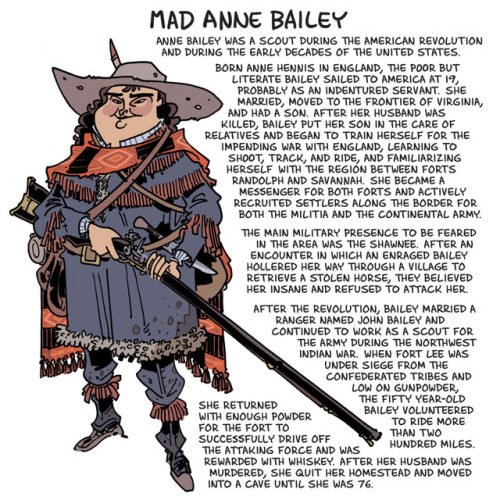
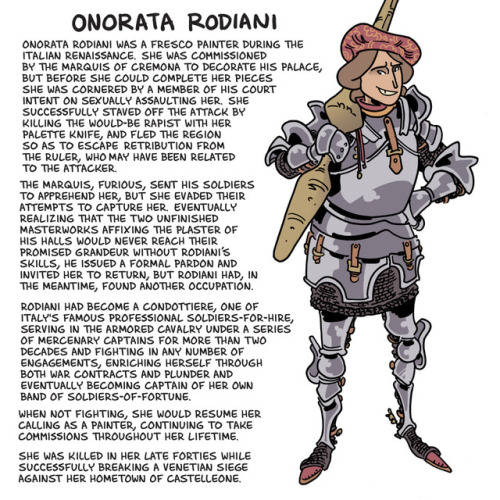
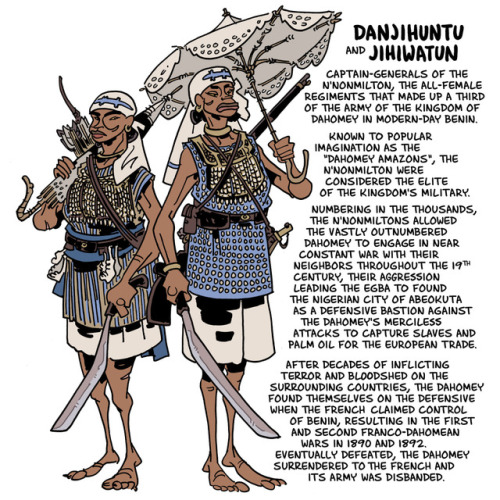
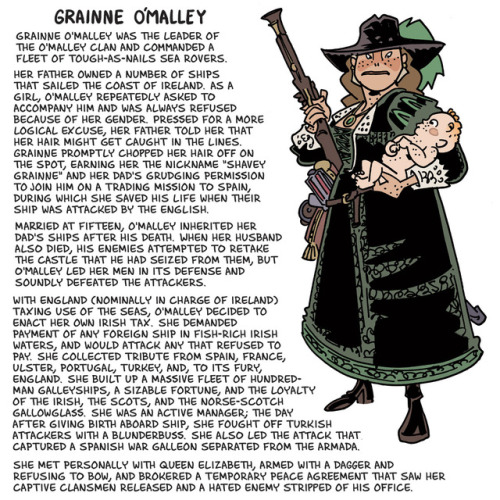
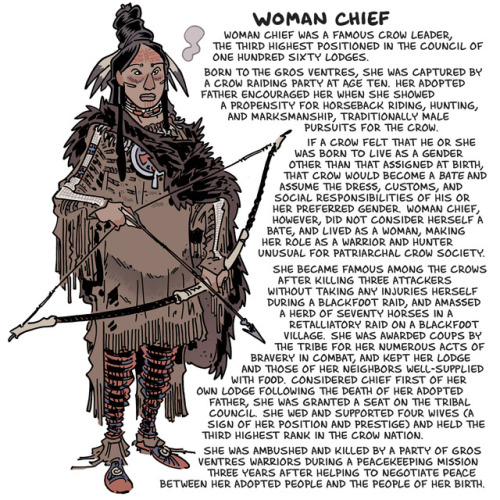
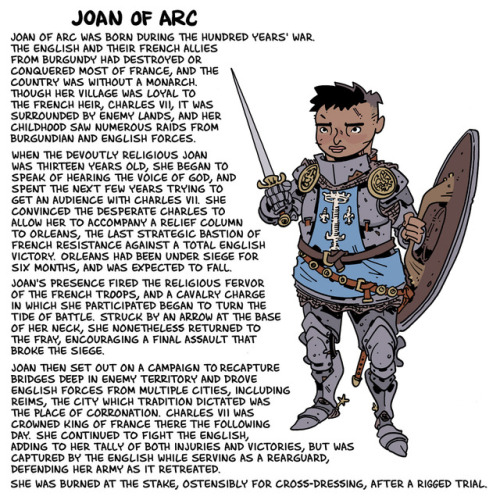
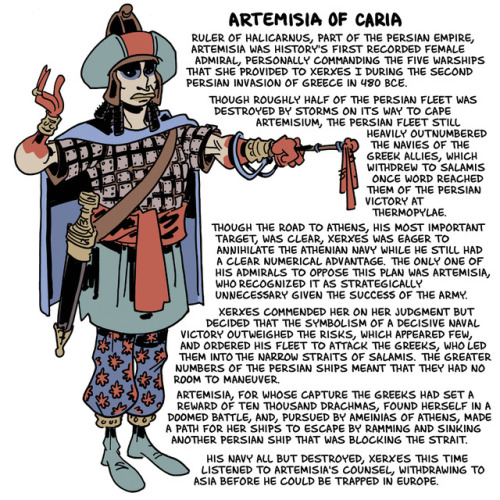
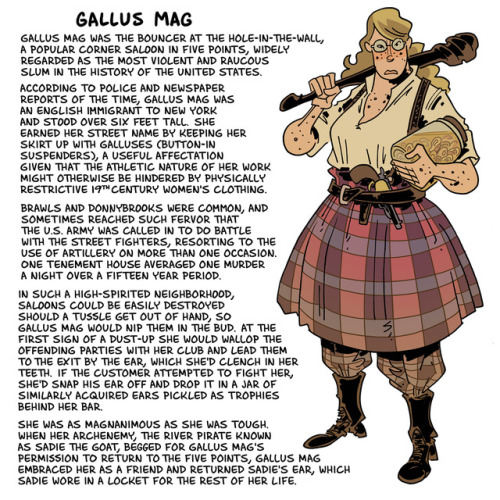
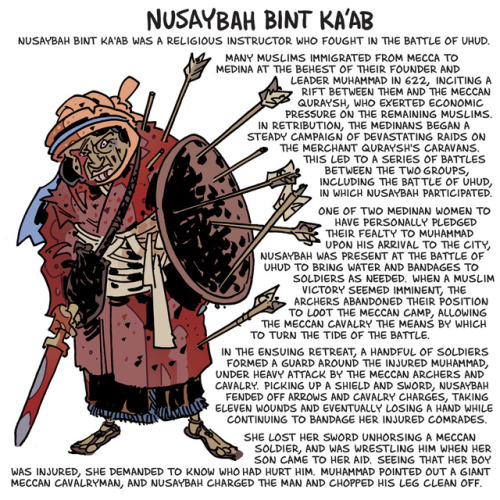
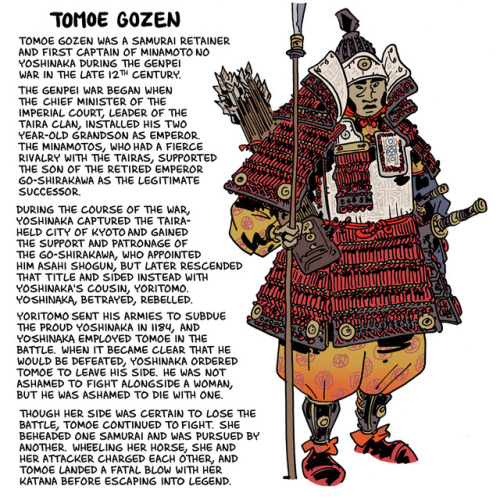






Last year I did a few write-ups and drawings about some lady fighters from history who fought openly as their gender (there are plenty of disguised-as-a-man soldiers and plenty of trans soldiers, but those are outside the scope of this series). This is by no means an exhaustive list; there were plenty of great figures that my schedule didn’t permit me to tackle (at least not yet). But as Women’s History Month gets started tomorrow, I thought y’all might enjoy reading about some of history’s toughest broads.
More Posts from Jjgaut and Others
A Vulcan named Stork works at the Terran adoption agency. Parents always request that he be the one to deliver their child to them.
Oscar Nomination Predictions
Once I get around to finishing up a few of the high-praised films I haven't gotten to (Selma, American Sniper, Mr. Turner, a few others), I'll do a best films list, but I don't think viewing those will change my predictions here too much.
On the other hand, finally seeing Whiplash (which is amazing) convinced me that it has a better chance than I thought, so who knows?
Best Picture The last three years have had nine nominees, so I'll put that many, more or less in order of likelihood. I'll be genuinely shocked if one of the top four doesn't show up. Boyhood Birdman The Imitation Game Selma The Grand Budapest Hotel Theory of Everything Whiplash Gone Girl American Sniper And if there's a tenth nominee, I think it'll be one of these, in this order of likelihood: Foxcatcher - [The enthusiasm for this one seems very limited, but then again, Miller's other two movies (Capote & Moneyball) were more of the "respect" than "love" kinda movies, and they got nominated anyway. He definitely has his fans in the academy. Nightcrawler -A solid Dark Horse here. Unbroken - Opinions are very mixed, and even the positive reactions seem to be in the "good, not great" category. It might get in on sheer "heroic WWII flick" factor, though. Mr. Turner - Unknown enough that it might get lost in the mix, but it's certainly universally praised. Interstellar - Probably wishful thinking to even put it as the "least likely nominee", but I imagine it'll get enough support to have a very, very distant chance. After all, it's been hanging on in the lower parts of the charts to make a good $25 million more than expected. Also, I'd love to see this get an Oscar bump at the box office, which should be enough to get it over $200 million and maybe even in the top 10 of the year. Not that box office or awards matter that much at the end of the day, but it would make this kind of crazy ambitious sci-fi - and original films in general - easier to get through the system. Also, it was awesome. Director
These three seem pretty well locked: Richard Linklater (Boyhood) Alejandro González Iñárritu (Birdman) Ava DuVernay, (Selma) But the last two I'm not sure about at all. I guess this is the order of likelihood to my mind: Wes Anderson - Grand Budapest was fantastic, and dazzlingly made. I imagine Anderson will finally get a directing nod on the "It's his time" vote, but it still might be too quirky to get broad support. Morten Tyldum - The Imitation Game is certainly an excellent film and is going to get a lot of nominations, but the directing seems fairly straightforward. Or maybe it's just a shock that something that middle-of-the-road feeling came from the guy who did [i]Headhunters[/i]. Anyway, it wouldn't surprise me if something flashier got in instead. Clint Eastwood - apparently American Sniper is the usual "rough around the edges but highly effective" thing late-period Eastwood does, which has a way of splitting opinions. Plus, he already has two directing Oscars, so there's not exactly an overwhelming sense of him being under appreciated. Still, he'll probably get a number of votes from older members.
Damien Chazelle - Whiplash is absolutely incredible, and it might pull off the final slot on sheer quality.
David Fincher - This probably depends on how much the Academy actually liked Gone Girl. I have a feeling it's just lowbrow enough that Fincher will miss the shortlist.
Actor Michael Keaton (Birdman) Eddie Redmayne (Theory of Everything) David Oyelowo (Selma) Benedict Cumberbatch (Imitation Game) The top four there are probably locks; certain the top two are. The last slot seems like a battle between Steve Carell (Foxcatcher), Jake Gyllanhaal (Nightcrawler), Ralph Fiennes (Grand Budapest), Bradley Cooper (American Sniper), and Timothy Spall (Mr. Turner). I guess I'll bet on Fiennes, but none of the others would surprise me. I'd really love to see Miles Teller get it for Whiplash, unlikely as that may be.
Actress
Since Hollywood doesn't give enough great leading parts to women, this category is a lot more likely to go to more obscure performances. Julianne Moore (Still Alice) Reese Witherspoon (Wild) Rosamund Pike (Gone Girl) Jennifer Aniston (Cake) Felicity Jones (Theory of Everything) Longshots: Marion Cotillard (Two Days, One Night), Gugu Mbatha-Raw (Beyond The Lights), Shailene Woodley (The Fault In Our Stars), Jenny Slate (Obvious Child)
Supporting Actor JK Simmons (Whiplash) Edward Norton (Birdman) Ethan Hawke (Boyhood) Robert Duvall (The Judge) Chris Pine (Into the Woods) Pine is probably a risky prediction; Mark Ruffalo in Foxcatcher might be a safer bet. I would love Tyler Perry to pull a surprise nomination for Gone Girl, and that's not entirely out of the question.
Supporting Actress
Patricia Arquette (Boyhood) Emma Stone (Birdman) Jessica Chastain (A Most Violent Year) Tilda Swinton (Snowpiercer) Rene Russo (Nightcrawler) Meryl Streep is probably a wiser bet, but I think that would be 100% an "It's Meryl Streep" vote. Then again, she got nominated last year for exactly that. Keira Knightley might get swept in if The Imitation Game has any coattails. (she's very good, but not in a particularly flashy way) Carmen Ejogo (Selma) and Carrie Coon (Gone Girl) are longshots. I've also heard Kristen Stewart is outstanding in Still Alice, and I would love for her to get nominated the same way I want to see Tyler Perry get one.
Original Screenplay
Birdman - Alejandro González Iñárritu, Nicolás Giacobone, Alexander Dinelaris, Armando Bo Boyhood - Richard Linklater The Grand Budapest Hotel - Wes Anderson & Hugo Guinness Dan Gilroy - Nightcrawler Paul Webb - Selma
Mike Leigh might take Nightcrawler's spot for Mr. Turner. The LEGO Movie (Phil Lord & Christopher Miller) and Top Five (Chris Rock) wouldn't shock me. Justin Simien (Dear White People) would be a surprise.
Adapted Screenplay
Gone Girl - Gillian Flynn The Imitation Game - Graham Moore The Theory of Everything - Anthony McCarten Whiplash - Damien Chazelle Snowpiercer - Joon-ho Bong, Kelly Masterson
I doubt Guardians of the Galaxy will get in (if The Dark Knight couldn't nominated), but it'd be a gas if it did.
Kinda of random but what do you think of Alan's Moore comments about people liking comic book movies could lead into fascism? Seems like bitter old man territory but what do you think?
I think it's fair to say that fascism has been something of an obsession of Alan Moore's and a recurring although not omnipresent theme in many of his works.
While Miracleman is technically an expy of Captain Marvel, I would argue that the series is Moore's most extended commentary on Superman instead and especially the idea of the ubermensch. In Miracleman, our protagonist is initially thought to have been made into a superhero by a benevolent enlightened scientist, but eventually we learn that Miracleman is the product of an Operation Paperclip Nazi science project called the Zarathusa Project designed to create the literal Nietzschean Ubermensch, complete with a fixation on "blond gods" and a eugenicist breeding program. A superhero fight in the midle of London causes mass civilian casualties on the scale of an atomic bomb going off. Ultimately, Miracleman effectively overthrows Thatcher's government and rules as an enlightened despot before eventually leaving Earth for space.
Likewise, I think Watchmen is Moore's most extended commentary on masked vigilantism and thus on Batman. In Watchmen, the phenomenon of vigilantism is repeatedly associated with right-wing politics: Hooded Justice is a German circus strongman who has pro-Nazi politics; Captain Metropolis wanted his superhero teams to target "black unrest," "campus subversion," and "anti-war demos;" and the Comedian is a brutal nihilist who ultimately joins the U.S security state where he cheerfully follows orders to assassinate JFK and Woodward and Bernstein, commit atrocities in Vietnam, kill protesting hippies, etc. Finally, there's Rorschach, Moore's most famous mis-interpreted creation - Rorschach is a paranoid conspiracy theorist who's an anti-communist, anti-liberal, militant and militaristic nationalist, homophobe, misogynist, and avid follower of the John Birch Society-like New Frontiersman.
And then there's V for Vendetta, which I would argue is Moore's attempt to create a masked vigilante superhero with his own anarchist politics. In this story, the vigilante isn't a crimefighter but rather a revolutionary who seeks the overthrow of a fascist state and the creation of an anarchist utopia.
Moreover, his more recent comments about comic book movies being linked to fascism are arguably just part of his much longer-running commentary that superheroes as a concept are at the very least proto-fascist.
Having read a lot of Moore's work and interviews on the subject, I don't find his critique compelling. I think his definition of fascism is far too loose, I think his lens on the superhero genre is overly narrow, and I think his mode of analysis tends to neglect the vital area of historical context.
Definitions
So let's start with Moore's definition of fascism. I think Moore tends to really over-emphasize the whole idea of the Nietzschean ubermensch and the use of force to solve problems, and more recently he's been on this weird kick of saying that nostalgia and a childlike desire for easy solutions leads to fascism. I have several problems with this definition:
the first is that, as I've talked about in the past, fascism is a very complex historical phenomenon that can't be boiled down to a single idea, and in particular the idea of the ubermensch is a pretty small part of the German case (and even then how do you balance it against Nazism's more anti-individualistic aspects, like the mass party and the mass party organization).
the second is that the idea of a larger-than-life individual using physical prowess to solve problems is not unique to fascism. After all, during the 30s, you also had the Soviet Union promoting the heroic ideal of Stakhanovitism and the depiction of the heroic male factory worker in socialist realism. More importantly, the idea of a "larger-than-life individual using physical prowess to solve problems" is basically the same description for any number of literary figures from pulp cowboys to the Greek heroes of the Iliad and the Oddessy to the epic of Gilgamesh.
the third is that I think Moore's definition overlooks the actual drivers of the rise of contemporary fascism. Anti-semitism, racism, homophobia and transphobia, misogyny - all of these are real social and cultural forces that are actually motivating people to join the ranks of the alt-right, to commit massacres, to riot at the Capitol, and so forth. It is incredibly self-involved to think that superheroes and superhero movies are worth discussing in the same breath. At the end of the day, they're harmless entertainment compared to the real political issues that need to be tackled.
Moore's Model of Superheroes
Here's where I'm going to say something that's going to be a bit controversial - I don't think Alan Moore has read widely enough in the superhero genre to make an accurate assessment of its relationship to fascism. If we look at his comics work, and we look at his writings, and we look at his interviews, Moore's mental model of the superhero really only includes two figures, Superman as the representative of the superpowered ubermensch and Batman as the representative of the masked vigilante crimefighter. Notably, Moore hasn't really touched the last of the Big Three - Wonder Woman, a superhero with a strong legacy of radical left-wing politics. I do think we have to mention, given Moore's somewhat troubled history when it comes to issues of gender, that Moore's model of the superhero doesn't include any female superheroes (or for that matter, any superheroes of color or queer superheroes). (EDIT: I should clarify - Promethea is Moore's version of Wonder Woman, but she doesn't really come up in his discussions of fascism, and her thematic profile has more to do with Moore's interests in magic.)
And other than Captain Britain, Moore never worked with any Marvel character and basically ignores them.
To me, this is like having a career as a painter and never working with colors. Moore's model of the superhero leaves out the Fantastic Four and how their flawed psychologies revolutionized the industry and the whole idea of the superhero-as-explorer, it leaves out Spider-man and the idea of the superhero-as-everyman who's central struggle is about work-life balance and altruism, and most importantly it leaves out the X-Men and the idea of the mutant metaphor.
If as a critic you're going to make grand pronouncements about something as morally evil as fascism, I think it really is incumbent on you to have read and analyzed wildly rather than cherry-picking a couple of case studies. Especially if you have something of a tendency to mis-characterize those case studies by ignoring historical context.
Historical Context
So let's talk about Superman and Batman and their emergence in the 1930s. One vital bit of context is that the U.S experienced a significant crime wave in the 1920s and 1930s as Prohibition encouraged the rise of organized crime and then the Great Depression spurred the rise of kidnapping and bank robbery gangs. Moreover, municipal police forces tended to be wildly corrupt, accepting bribes from organized crime to let them operate with impunity, while not letting up in the slightest in their brutal oppression of workers and minorities.
In this context, I think the idea of vigilantism - while it has an undeniably racist legacy dating back to Reconstruction - is not purely a conservative phenomena. It's also an expression of a desire for help from somebody, anybody when the powers that be are of no help. And at the end of the day, unsanctioned use of force can equally be traced back to left-wing self-defense efforts from the Panthers back to the Communist Party's streetfighting corps to unions packing two-by-fours on the picket line - so I don't think we can simply equate punching a bad guy with racist lynch mobs and call it a day.
So let's talk about Superman and the ubermensch. I think Moore has a bad tendency to focus on his nightmare scenrio of a godlike being tyrannizing and destroying hapless humanity, while minimizing the actual ideas of Siegel and Schuster. He tends to take their use of the Nietzschean as a straighforward invocation instead of the clear subversion it was intended to be - rather than a blond god who imposed tyrannical rule with horrific violence, Siegel and Schuster made their Superman a dark-haired Moses allegory, who rather than solely fighting crime acted to stop wife-beaters, war profiteers, and save the life of death row inmates, and whose secret identity was of a crusading journalist who uncovered corrupt politicians.
To be fair, Alan Moore admits that Superman started out as "very much a New Deal American” - but because this kind of does near-fatal damage to his argument, he quickly minimizes that by saying that Superman got co-opted and thus it doesn't count. This is some No True Scotsman bullshit - Moore knows that his example just imploded so he tries to wriggle out of it by arguing that Superman sold out to the Man. If we go back to the actual historical evidence, we can see that at the outset of the Red Scare, the Superman radio show went on a crusade against the Klan, and throughout the conservative 1950s, Superman was used to propagandize liberal values of religious and racial equality:

So much for selling out.
On the other hand, Batman is a tougher case, given that his whole deal is being a masked vigilante who wages an unending war on crime to avenge his murdered parents. So is Batman an inherently fascist figure, a wealthy sadist who spends his time brutally beating the poor and the mentally ill when he could be using his riches to tackle social issues? I would argue that this version of Batman is actually pretty recent - very much a legacy of the work of Frank Miller and then the post-9/11 writings of Christopher Nolan, Johnathan Nolan, and David Goyer - and that there have been many different Batmen with very different thematic foci.

For example, the early Batman was as much a figure of horror as he was of superheroics - he fought Frankensteins and Draculas, he killed with silver bullets, etc. Then in the 40s and 50s, you got the much more cartoony and light-hearted Batman who pretty much exclusively fought equally oddball supervillains in such a heightened world of riddles and giant pennies and mechanical T-Rexes that I don't think you can particularly describe it as "crime-fighting." Then in the 1960s, you have the titanic influence of the Batman TV show, where Adam West as Batman was officially licensed by the Gotham P.D (so much for vigilantism) and extolled the virtues of constitutional due process and the Equal Pay Act in PSAs and episodes alike. You can call the 1966 Batman a lot of things, but fascist isn't one of them.
Conclusion
I want to emphasize at the end of the day that I'm a huge Alan Moore fan; I've read most of his vast bibliography, I find him a fascinating if very odd thinker and critic, I've even tried to read his mammoth novel Jerusalem (which is not easy reading, let me tell you). At the same time, it's important not to treat creators, even the very titans of the medium, as incapable of error. And in this case, I think Alan Moore is simply wrong about fascism and superheroes and people should really stop asking him about it, because I don't think he has anything new to say about it.
This is my headcanon now.
We know that Varys tried to convince Aerys to keep the gates closed the Lannister army and that Pycelle encouraged Aerys to open them wide. That indicates that they were both present in KL during the final days of the Rebellion. My question is this, do you think once the doors were open and the Lions started sacking the city, that both the master of Whispers and Grand Maester simply ‘vanished’ until the dust had settled?
I believe Pycelle probably went to his apartments, barricaded the door, and waited until Lannister troops came to escort him safely to Tywin's forces. The Grand Maester, as a position, benefits from "maester neutrality," so that does assist him in not being seen as an Aerys loyalist, even if Northern troops happened to get to him first.
Varys though, almost certainly disappeared into the labyrinth of secret passages honeycombing the Red Keep to ensure the safety of his person. He perceived that he would have probably been killed in the sack. and so he'd look for a place no one knew until he could arrange to surrender himself to Robert. Robert's legendary status as those who pardoned his former foes probably worked in Varys's favor there.
Thanks for the question, Anon.
SomethingLikeALawyer, Hand of the King

My review of Marvel’s first ever movie!
Man, Ophelia gets even more screwed in this version.
Hamlet, Scooby-Doo Style
[This is one of the funniest, most brilliant damn things I’ve ever read. It dates from very early Internet days and I thought it deserved resurrection to Le Tumble]
This recently discovered folio edition of “Hamlet” follows other known versions closely until Act V, Scene II, where it begins to diverge at line 232, as will be seen:
KING: …`Now the king drinks to Hamlet.’ Come, begin, And you the judges, bear a wary eye.
Trumpets sound. HAMLET and LAERTES take their stations
HAMLET: Come on, sir.
LAERTES: Come, my lord.
Enter FRED, DAPHNE, VELMA, SHAGGY, AND SCOOBY
DAPHNE: Wait!
SHAGGY: Stop the fight!
HAMLET and LAERTES put up their foils
KING: I like this not. Say wherefore you do speak?
FRED: Good lord, I pray thee, let thy anger wait. For we, in seeking clues, have found the truth Behind the strange events of latter days.
VELMA: The first clue came from Elsinore’s high walls, Where, so said Hamlet, Hamlet’s ghost did walk. Yet though the elder Hamlet met his death, And perforce hath been buried in the ground, ‘Tis yet true one would not expect a ghost To carry mud upon his spectral boots. Yet mud didst Shaggy and his faithful hound Espy, with footprints leading to a drop. This might, at first, indeed bespeak a ghost… Until, when I did seek for other answers, I found a great, wide cloth of deepest black Discarded in the moat of Elsinore. ‘Tis clear, the “ghost” used this to slow his fall While darkness rendered him invisible.
FRED: The second clue we found, my lord, was this.
KING: It seems to me a portrait of my brother In staine’d glass, that sunlight may shine through.
FRED: But see, my lord, when placed before a lantern–
KING: My brother’s ghost!
HAMLET: My father!
VELMA: Nay, his image.
FRED: In sooth, that image caught the Prince’s eye When he went to confront his lady mother. Nor did his sword pierce poor Polonius. For Hamlet’s blade did mark the castle wall Behind the rent made in the tapestry. Polonius was murdered by another. The knife which killed him entered from behind.
LAERTES: But who?
FRED: Indeed my lords, that you shall see.
HAMLET: And if this ghost was naught but light and air, Then what of that which I did touch and speak to?
The GHOST enters.
GHOST: Indeed, my son.
SHAGGY: Zoinks!
DAPHNE: Jenkies!
GHOST: Mark them not. Thou hast neglected duty far too long. Shall this, my murderer, live on unharmed? Must I remain forever unavenged?
SCOOBY and SHAGGY run away from the GHOST. SCOOBY, looking backward, runs into a tapestry, tearing it down. As a result, tapestries around the walls collapse, one surrounding the GHOST.
GHOST: What?
FRED: Good Osric, pray restrain that “ghost”, That we may reach the bottom of the matter. Now let us see who truly walked tonight.
FRED removes the helm and the disguise from the GHOST’S face.
ALL: Tis Fortinbras!
FRED: The valiant prince of Norway!
FORTINBRAS: Indeed it is, and curses on you all! This Hamlet’s father brought my own to death, And cost me all my rightful heritage. And so I killed this king, and hoped his son Would prove no obstacle to Norway’s crown. Then Claudius bethought himself the killer (As if one might be poisoned through the ear!) The brother, not the son, took Denmark’s throne, And held to Norway with a tighter grip. I swore an end to Denmark’s royal house. I spoke to Hamlet of his uncle’s crimes. Then killed Polonius to spark Laertes. This day, with poison’s aid, all might have died, And Denmark might have come to me as well As my beloved Norway and revenge. My scheme blinded them all, as if by fog But for these medd'ling kids and this their dog.
KING: The villain stands confessed. Now let us go. For much remains to us to be discussed. And suitable reward must needs be found For these, our young detectives and their hound.
EXEUNT OMNES. Copyright 1993 Michael S. Schiffer
Consider the god of salmon.
There is a god of salmon, somewhere in the gravel and the pebbles of the spawning redd. All salmon are aware of it as soon as they are born, in their own, private, fishy ways, and remember their god of salmon when they leave the spawning grounds and journey into the saltwaters beyond.
Theirs is the god of journeys and returnings.
Eventually, every salmon is struck by the urge to return to the holy lands of its ancestors. They pray to the god of salmon, asking for protection against bears and other predators on the journey.
“Deliver us from eagles,” the salmon pray.
All animals get their own gods, and those animal gods get their own prayers. The gods of mice and rabbits and other small, squeaking, hunted things usually get prayers along the lines of, “Oh please, oh please, oh please…”
Unlike those fickle gods, parishioners of the god of salmon get results.
Salmon get miracles.
A salmon returns to freshwater and discovers that it can breathe.
A salmon swimming against the current watches its spine curl, its teeth lengthen, sees grey scales turn red.
A salmon comes to a waterfall and discovers that it can fly…
Eventually the salmon complete their pilgrimage, and return to the holy lands of their ancestors.
Many raucous orgies are held.
Hallelujah.
And then, exhausted, the salmon die. The land flourishes as residual nutrients run through creeks and estuaries.
And the god of salmon continues, buoyed on the souls and prayers of millions of martyrs.
poll time because something my mother said pissed me off lmao
and in the tags tell me your gender and age?


simongerman600
Goncharov's main theme - one of the most beautiful movie themes from the 70s!
all this talk about goncharov but i dont see anybody posting the soundtrack??? like how are you gonna talk about this movie without the music
-
 fluerdemal reblogged this · 1 month ago
fluerdemal reblogged this · 1 month ago -
 bluebell53 reblogged this · 1 month ago
bluebell53 reblogged this · 1 month ago -
 bluebell53 liked this · 1 month ago
bluebell53 liked this · 1 month ago -
 raaafl reblogged this · 1 month ago
raaafl reblogged this · 1 month ago -
 cityboys-modelgirls reblogged this · 2 months ago
cityboys-modelgirls reblogged this · 2 months ago -
 1847752d liked this · 2 months ago
1847752d liked this · 2 months ago -
 luckyicekitsune liked this · 2 months ago
luckyicekitsune liked this · 2 months ago -
 dangerhumming reblogged this · 2 months ago
dangerhumming reblogged this · 2 months ago -
 littleblackmirrors liked this · 2 months ago
littleblackmirrors liked this · 2 months ago -
 theapparatusissublime reblogged this · 2 months ago
theapparatusissublime reblogged this · 2 months ago -
 theapparatusissublime liked this · 2 months ago
theapparatusissublime liked this · 2 months ago -
 thesobsister liked this · 2 months ago
thesobsister liked this · 2 months ago -
 doubtspirit reblogged this · 2 months ago
doubtspirit reblogged this · 2 months ago -
 burnt-tomato-slush liked this · 3 months ago
burnt-tomato-slush liked this · 3 months ago -
 alteregodepega liked this · 4 months ago
alteregodepega liked this · 4 months ago -
 darksideblargh liked this · 4 months ago
darksideblargh liked this · 4 months ago -
 doubtspirit liked this · 4 months ago
doubtspirit liked this · 4 months ago -
 yuisversion reblogged this · 4 months ago
yuisversion reblogged this · 4 months ago -
 yuisversion liked this · 4 months ago
yuisversion liked this · 4 months ago -
 theweirdkidnextdoor liked this · 5 months ago
theweirdkidnextdoor liked this · 5 months ago -
 paper-pen-and-pizza reblogged this · 5 months ago
paper-pen-and-pizza reblogged this · 5 months ago -
 paper-pen-and-pizza liked this · 5 months ago
paper-pen-and-pizza liked this · 5 months ago -
 melliferousbeing liked this · 5 months ago
melliferousbeing liked this · 5 months ago -
 heyitsmeyogirl liked this · 6 months ago
heyitsmeyogirl liked this · 6 months ago -
 eepylilguy reblogged this · 6 months ago
eepylilguy reblogged this · 6 months ago -
 smolbeansnas liked this · 6 months ago
smolbeansnas liked this · 6 months ago -
 antedelaureans reblogged this · 6 months ago
antedelaureans reblogged this · 6 months ago -
 antedelaureans liked this · 6 months ago
antedelaureans liked this · 6 months ago -
 larryad liked this · 6 months ago
larryad liked this · 6 months ago -
 unfocused-angel liked this · 6 months ago
unfocused-angel liked this · 6 months ago -
 gchurch555 liked this · 7 months ago
gchurch555 liked this · 7 months ago -
 klavat reblogged this · 7 months ago
klavat reblogged this · 7 months ago -
 klavat liked this · 7 months ago
klavat liked this · 7 months ago -
 aishoka-j reblogged this · 8 months ago
aishoka-j reblogged this · 8 months ago -
 tilly-the-creator liked this · 8 months ago
tilly-the-creator liked this · 8 months ago -
 hi-welcome-to-fartchie reblogged this · 8 months ago
hi-welcome-to-fartchie reblogged this · 8 months ago -
 hi-welcome-to-fartchie liked this · 8 months ago
hi-welcome-to-fartchie liked this · 8 months ago -
 starsilversword reblogged this · 8 months ago
starsilversword reblogged this · 8 months ago -
 starsilversword liked this · 8 months ago
starsilversword liked this · 8 months ago -
 kairyuuyaps liked this · 9 months ago
kairyuuyaps liked this · 9 months ago -
 wild-wombytch liked this · 9 months ago
wild-wombytch liked this · 9 months ago -
 yaboydeidara liked this · 9 months ago
yaboydeidara liked this · 9 months ago -
 you-there-with-the-hat liked this · 10 months ago
you-there-with-the-hat liked this · 10 months ago -
 fanfic-addict5 liked this · 10 months ago
fanfic-addict5 liked this · 10 months ago -
 peanut-butters-my-jam reblogged this · 10 months ago
peanut-butters-my-jam reblogged this · 10 months ago -
 peanut-butters-my-jam liked this · 10 months ago
peanut-butters-my-jam liked this · 10 months ago -
 zoanzon reblogged this · 10 months ago
zoanzon reblogged this · 10 months ago -
 zoanzon liked this · 10 months ago
zoanzon liked this · 10 months ago